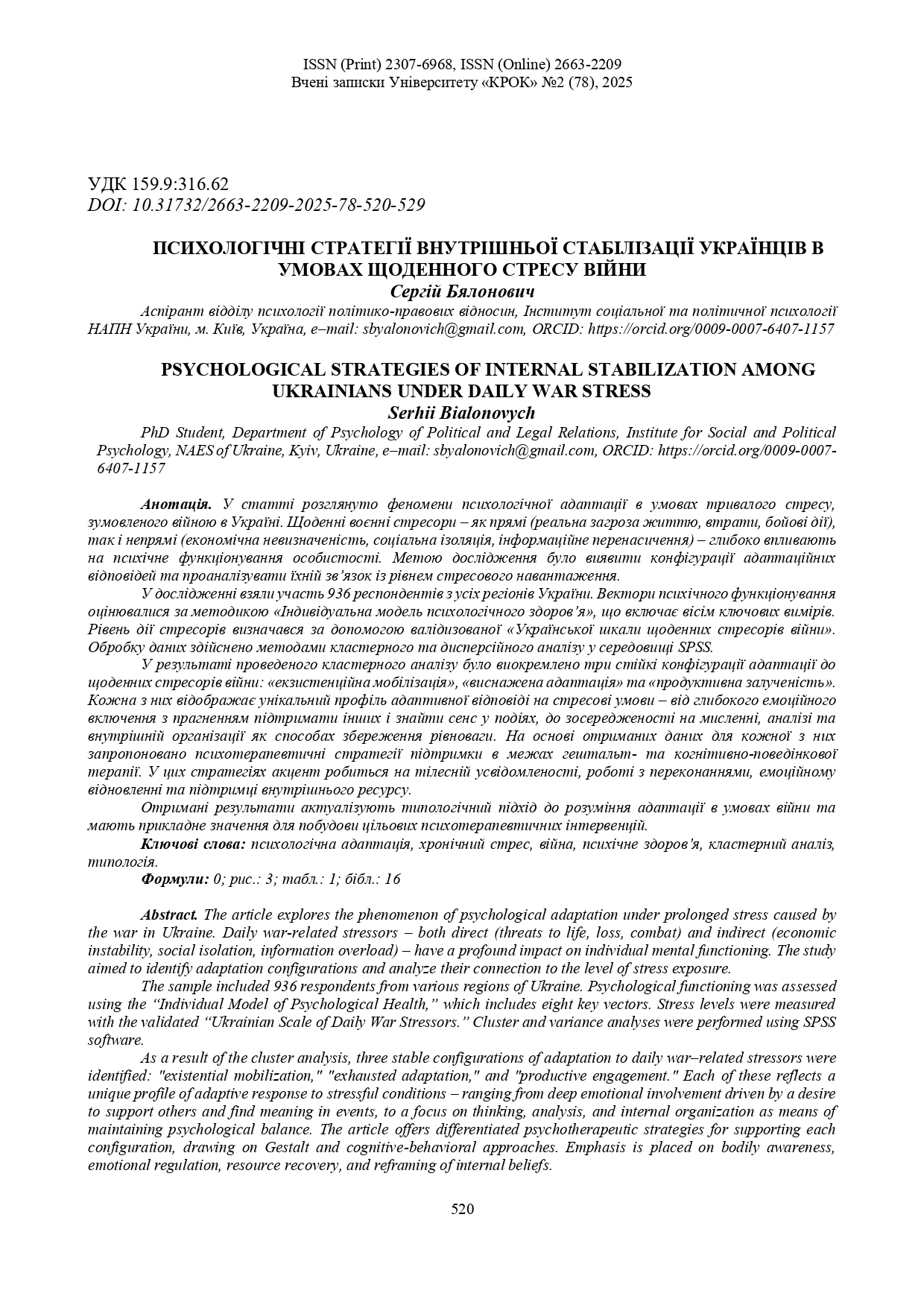PSYCHOLOGICAL STRATEGIES OF INTERNAL STABILIZATION AMONG UKRAINIANS UNDER DAILY WAR STRESS
DOI:
https://doi.org/10.31732/2663-2209-2025-78-520-529Keywords:
psychological adaptation, chronic stress, war, mental health, cluster analysis, typologyAbstract
The article explores the phenomenon of psychological adaptation under prolonged stress caused by the war in Ukraine. Daily war-related stressors – both direct (threats to life, loss, combat) and indirect (economic instability, social isolation, information overload) – have a profound impact on individual mental functioning. The study aimed to identify adaptation configurations and analyze their connection to the level of stress exposure.
The sample included 936 respondents from various regions of Ukraine. Psychological functioning was assessed using the “Individual Model of Psychological Health,” which includes eight key vectors. Stress levels were measured with the validated “Ukrainian Scale of Daily War Stressors.” Cluster and variance analyses were performed using SPSS software.
As a result of the cluster analysis, three stable configurations of adaptation to daily war–related stressors were identified: "existential mobilization," "exhausted adaptation," and "productive engagement." Each of these reflects a unique profile of adaptive response to stressful conditions – ranging from deep emotional involvement driven by a desire to support others and find meaning in events, to a focus on thinking, analysis, and internal organization as means of maintaining psychological balance. The article offers differentiated psychotherapeutic strategies for supporting each configuration, drawing on Gestalt and cognitive-behavioral approaches. Emphasis is placed on bodily awareness, emotional regulation, resource recovery, and reframing of internal beliefs.
The findings support a typological approach to adaptation in wartime and provide a basis for developing targeted psychological interventions.
Downloads
References
Блінов, О. А. (2018). Бойовий стрес та результати його емпіричного дослідження. Психологічний часопис: зб. наук. праць, 2(12), 9–22.
Бялонович, С. (2024). Українська шкала щоденних стресорів війни: конструювання опитувальника. Проблеми політичної психології, 15(29), 178–192. https://doi.org/10.33120/popp–Vol15–Year2024–156
Завгородня, О. В. (2007). Проблема психологічного здоров’я: спроба теоретичного аналізу. Практична психологія та соціальна робота, 1, 55–60.
Козлов, О. В. (2015). Культурно-специфічні моделі психологічного здоров’я. Актуальні проблеми психології: зб. наук. праць, 7(38), 233–244.
Кравченко, К. О., Тімченко, О. В., & Широбоков, Ю. М. (2017). Соціально-психологічні детермінанти виникнення бойового стресу у військовослужбовців – учасників антитерористичної операції: монографія. Харків: НУЦЗУ.
Лялюк, Ю. (2024). Психологічні особливості стресостійкості офіцерів Національної гвардії України. Věda a perspektivy, 9(40), 15–32.
Сельє, Г. (1976). Стрес без дистресу. Київ: Наукова думка.
Coleman, J. S. (1988). Social capital in the creation of human capital. American Journal of Sociology, 94(Supplement), S95–S120. https://doi.org/10.1086/228943
Hobfoll, S. E. (1989). Conservation of resources: A new attempt at conceptualizing stress. American Psychologist, 44(3), 513–524.
Lazarus, R. S., & Folkman, S. (1984). Stress, appraisal, and coping. New York: Springer.
McEwen, B. S. (1998). Stress, adaptation, and disease: Allostasis and allostatic load. Annals of the New York Academy of Sciences, 840(1), 33–44.
Miller, K. E., & Rasmussen, A. (2010). War exposure, daily stressors, and mental health in conflict and post–conflict settings. Social Science & Medicine, 70(1), 7–16.
Panter-Brick, C., Eggerman, M., Mojadidi, A., & McDade, T. (2008). Social stressors, mental health, and physiological stress in an urban elite of young Afghans in Kabul. American Journal of Human Biology, 20(6), 627–641.
Sweller, J., Ayres, P., & Kalyuga, S. (2011). Cognitive load theory. New York: Springer.
Ungar, M. (2011). The social ecology of resilience: A handbook of theory and practice. New York: Springer.
World Health Organization. (2022). Mental health: Strengthening our response. https://www.who.int/news–room/fact–sheets/detail/mental–health–strengthening–our–response

Downloads
Published
How to Cite
Issue
Section
License

This work is licensed under a Creative Commons Attribution-NonCommercial 4.0 International License.

